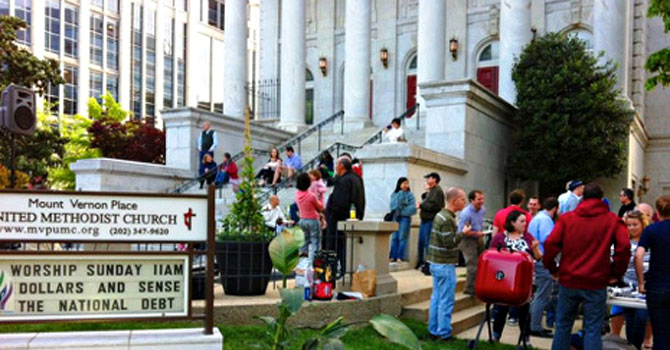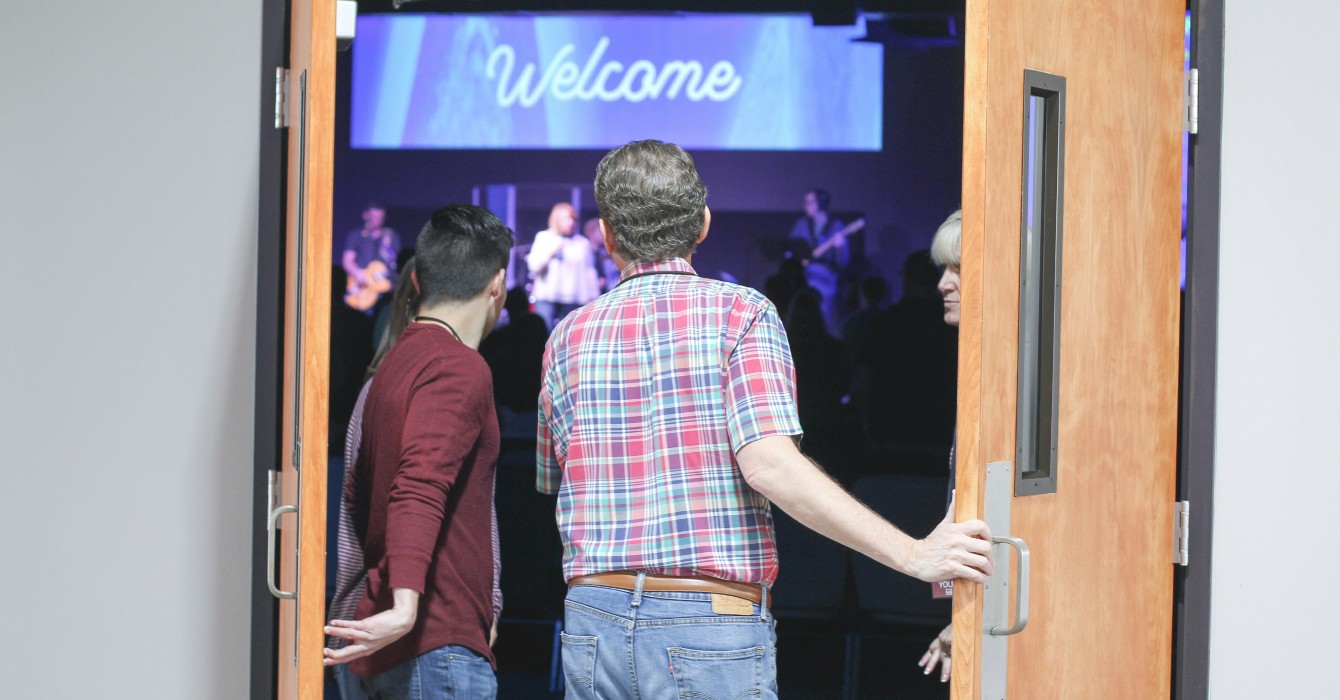From the introduction
We pastored urban congregations that managed to grow again, reversing decades of decline. For the past eleven years, Donna has been the pastor of Mount Vernon Place United Methodist Church in Washington, D.C. Roger, with his wife Ginger Thomas, were the copastors of Duke Memorial United Methodist Church in Durham, North Carolina, for five years. Over these periods of time, each of these congregations learned to let go of their nostalgic dreams and tired habits and walk with God into a new day of vibrancy, mission, and ministry.
 In A New Day in the City, we share the stories of these two churches and many more, and the lessons we ourselves have learned from experience and from studying the leadership of others, in order to help fellow pastors and congregations escape the whirlpool of decline and join God in the deep and wide mission of embodying the kingdom. Along the way, we challenge some of the typical clichés about church leadership, offering a fresh perspective on what congregational renewal can look like and how it can become a reality.
In A New Day in the City, we share the stories of these two churches and many more, and the lessons we ourselves have learned from experience and from studying the leadership of others, in order to help fellow pastors and congregations escape the whirlpool of decline and join God in the deep and wide mission of embodying the kingdom. Along the way, we challenge some of the typical clichés about church leadership, offering a fresh perspective on what congregational renewal can look like and how it can become a reality.
This book doesn’t offer easy answers, because churches that need to adapt and change to thrive can’t simply replicate what someone else has done or is doing. Rather, we offer the framework for seven crucial conversations urban churches need to have to find their own way to renewal:
- The process of pruning or letting go
- An invitation to rethink vision
- Ways to rethink strategy
- How to overcome the divide that’s created between mission and evangelism
- How excellence can and should be embodied in a few key ways
- Thoughts on worship
- How the pastor, staff, and laity can more effectively work together
… Some will resist your invitations. Several people may become uncomfortable or even defensive when asked to respond to the questions we encourage you to consider. But we beg you to stop believing that a church that is declining in calm waters is more faithful than a church willing to risk much -- or risk it all -- by venturing out into a sea of uncertainty. We have witnessed the incredible gifts that come with risk-taking, letting go, trying something new, and seeing things in a different light. We would not trade the journey or where our congregations are now for anything.
From Chapter 2: Destination or Journey? Rethinking Vision
So What Does the Leader Do?
… First, we’ll tell you what she doesn’t do: corner every parishioner at every moment and give a “stump speech” about where the church needs to go. One author has suggested that any conversation a pastor has with a parishioner that doesn’t cast vision for where the congregation needs to go is missing key opportunities, and that every pastoral interaction is a chance to cast vision, to offer a clear picture of where the congregation is going; to make converts to the pastor’s vision. “Think of yourself as a persuader. A good stump speech is trying to make converts even out of those who think they are with you. … People and their finances are attracted to those who believe that they are going to make a difference” (Paul Borden, Direct Hit: Aiming Real Leaders at the Mission Field, Abingdon, 2006).
There’s certainly nothing wrong with being energetic and inspiring when we talk about the future. But churches will be more faithful -- and many pastors will be less stressed -- when pastors lay down the mantle of persuader-in-chief and recover their proper work as pastoral leaders and become theologians again and spiritual guides, helping congregations discern the most faithful way to live in the kingdom landscape.
That proper work means more than giving vision stump speeches and being a persuader. The leader gets to have more fun as she recovers her role as interpreter, storyteller, imagination inspirer, and discernment facilitator.
The pastor as interpreter performs the ongoing task of interpreting God’s kingdom here and now. She spends time in the scriptures and in prayer, trying to understand how the ancient language of God’s reign inaugurated in Christ and witnessed to by the church helps us to see more clearly our identity and purpose here and now. The mission statement at Duke Memorial when I arrived said that the church wanted to be a “sign and foretaste of God’s kingdom in downtown Durham.” But what does that mean? Week in and week out, through sermons and Bible studies and devotions before meetings, the pastor gets to help interpret the reality of God’s kingdom for us here and now.
The pastor helping to lead a church in renewal also becomes a storyteller. He will look for and tell stories of how the church is already embodying its identity and purpose in God’s kingdom. Where are signs of faithfulness as we inhabit together the landscape of God’s kingdom? Where is fruit beginning to grow on the newly pruned branches? Where are shoots of new life already visible? For many churches struggling to live into a future full of hope, despair blinds the eyes to these signs of life and faithfulness. The leader then acts as a mirror -- showing the church’s life to itself, helping it see both the times when it simply wants to bury its head, but also where it is responding faithfully to God’s always in-breaking kingdom.
I (Roger) heard Donna do this once in a particularly memorable sermon. The church had discerned that one of the ways it was being called to inhabit the landscape of God’s kingdom in its particular context was to practice hospitality throughout its life and work. It is not “casting a vision” in the traditional sense when Donna says, “As we continue to grow in faith as a congregation, I’ve learned that there are two things most important to us as a body. One is being a church where all are abundantly welcome. The other is providing a way to be a blessing to people who are currently unhoused.” She’s not telling the congregation where it needs to go or what it will look like in five years. Rather, she’s reflecting back to the congregation the very heart of its life in God’s kingdom that they discerned together. Much of the rest of the sermon tells stories about where she has seen this kind of hospitality happening in the congregation.
Try this:
By yourself or (preferably) as a group, think of three stories that show how your church is embodying God’s kingdom right now, then decide how you will tell these stories to the wider congregation.
Along with interpreting God’s kingdom here and now and pointing to ways the congregation is already living in that kingdom, the pastor inspires the imagination. No one can see the future with certainty; so we are unable to say, especially amidst constant change, exactly where we will be and what we will be doing. But that doesn’t mean we can’t inspire the imagination and help people to ask: If we continue to live our identity in God’s kingdom with increasing faithfulness, what can we imagine we might see happen? What might our fruit begin to look like?
This is exactly what Donna did in that sermon. She reflected to the congregation its own commitment to hospitality, told stories about where that hospitality is already being embodied, and then asked what might be next. Where are the places and the ways this hospitality can be extended? She offered examples from her own praying and imagining: “This week I’ve allowed myself to dream. I’ve been dreaming a lot, and my mind and heart have been consumed with what we could do.” And then she shared her dreams -- not to make “converts” to her side, and not to impose a vision untested by prayer and the congregation’s discernment, but to inspire their own holy imagining. Her dreams weren’t an agenda for the church she planned to push. Rather, they were examples of what the congregation could be if it continued to follow Jesus faithfully through the landscape of God’s kingdom.
Finally, the pastor acts as facilitator of discernment. Given our growing understanding of the kingdom, our sense of how we are already faithfully living in its landscape, and imaginations opened and awakened to holy possibilities, we finally get to the question: What do we do next? The traditional answer, imported along with vision-casting from the business world is: Come up with a strategic plan, one that will get you from point A to point B.
Certainly there is planning involved. But if renewal is more about living into God’s kingdom than about what we want to do, then what urban congregations need, more than a strategic planner, is a discernment facilitator -- someone who can create the spaces for the congregation to begin to ask and answer questions like: Given who we are, our unique identity in this time and place -- in this city -- what is God inviting us to do? What new ways are we being invited to embrace?
Excerpted from “A New Day in the City: Urban Church Revival,” published by Abingdon Press, 2017. Use with permission. All rights reserved.












